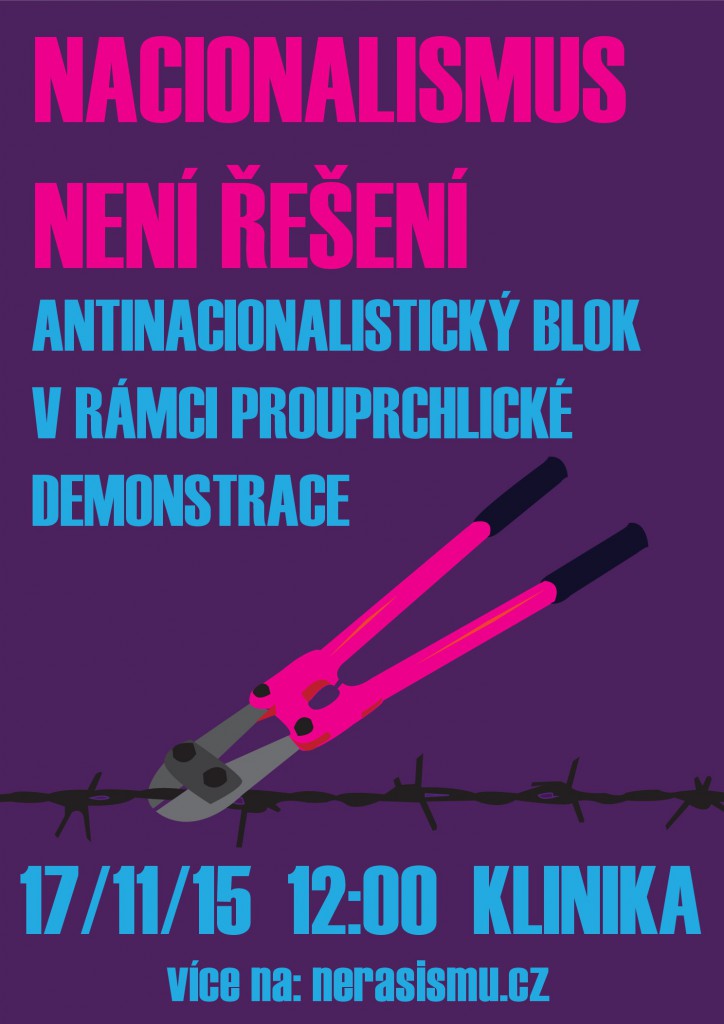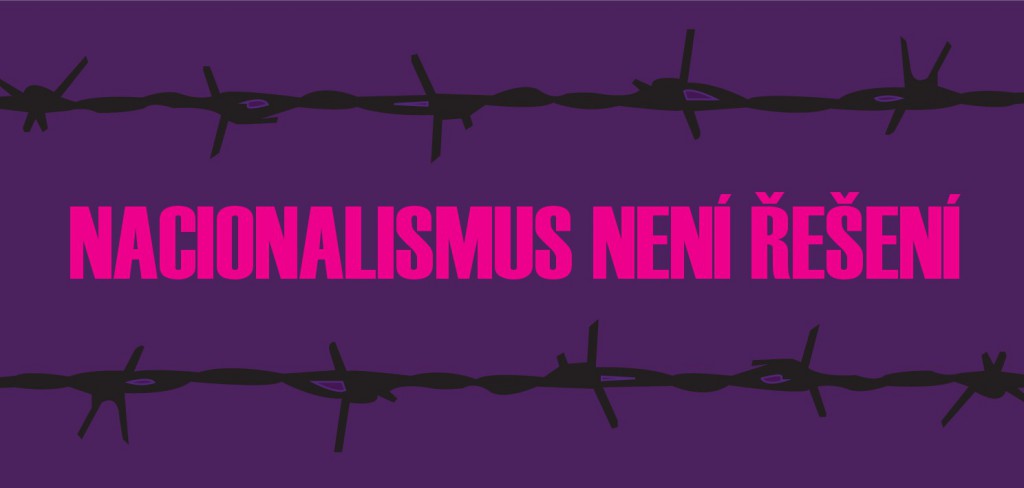V úterý 17. listopadu se v Praze na několika místech chtějí sejít xenofobní pravicoví populisté z různých spolků. Spojuje je jedno – jako řešení tzv. uprchlické krize nabízejí nacionalismus. Ve stejný den budou demonstrovat také zastánci přijetí uprchlíků. Také mezi nimi se někdy objevují tendence dát nacionalismu pozitivní obsah. Vytvořme společně antinacionalistický blok v rámci prouprchlické demonstrace 17. listopadu! [English below]
V souvislosti s uprchlickou krizí jsme svědky vzestupu nacionalistických sentimentů. Zatímco dříve byly národní vlajky charakteristické maximálně pro ultrapravicové demonstrace nebo sportovní utkání národního týmu, dnes je můžeme vidět i na demonstracích solidarity s uprchlíky. Součástí parlamentní politiky a mediální sféry je nacionalismus dlouhodobě, v současnosti ovšem dominuje diskursu jak největších médií, tak parlamentních politických stran.
Popularitu a zdání relevance získaly spolky, které donedávna fungovaly jako marginální facebooková společenství (IVČRN) nebo kroužek několika deprimovaných ultrapravičáků, marně toužících po moci (Národní demokracie Adama B. Bartoše). Na vlně nacionalismu se snaží surfovat i profesionální populista Tomio Okamura. Pozitivní je, že s nabytou popularitou nejsou (zatím) schopní efektivně pracovat. Hrají však důležitou roli užitečných idiotů pro vládní strany (především Chovancovu ČSSD), které využívají distancu vůči nim k legitimizaci svých vlastních nacionalistických a represivních politik. Považujeme za důležité postavit se jak nacionalismu ultrapravicových hnutí, tak nacionalismu státu!
Že je nacionalismus pevnou součástí ultrapravicových hnutí, není žádným překvapením. S růstem popularity těchto hnutí je logické, že se i více dostává do veřejného prostoru. Alarmující je ovšem fakt, že nacionalistická rétorika proniká i do progresivních, levicových a prouprchlických sfér. Již jenom rozdělování uprchlíků podle národnostního klíče na „legitimní“ Syřany a „nelegitimní“ zbytek, které zakrývá fakt, že žádný člověk není ilegální. Když se totiž podíváme na důvody útěku jednotlivých uprchlíků, vidíme válkou zničený Afghánistán a Irák, sektářský a autoritářský Irán a Pakistán, ekonomickými giganty zdevastovanou Afriku.
Představa, že nacionalismus lze naplnit určitým pozitivním obsahem (jako je tolerance a solidarita), vždy zákonitě narazí na to, co už nám historie stokrát zopakovala. Nacionalismus je vylučující a zpátečnická ideologie už ze své podstaty. Když se tak prouprchličtí aktivisté ohání českým právním státem, ohání se tak státem založeným na vylučování etnických menšin. Státem, který má za sebou historii nerovnoprávného postavení Slováků, Poláků, Maďarů a Němců za první republiky. Státem, který má za sebou druhorepublikový antisemitismus a poválečný odsun. A v neposlední řadě státem, který již od svého vzniku soustavně utlačuje Romy. Podobné zločiny má za sebou každý stát založený na národní identitě. Nacionalismus totiž vždy stojí na hledání vnitřního nebo vnějšího nepřítele. Člověk reflektující historii „svého“ národa tak k němu nemůže mít, při nejlepší vůli, vřelý vztah.
Pouhá nechuť k vlastnímu národu ovšem nestačí. V posledních dnech můžeme slyšet od mnoha lidí větu, která by ještě před dvěma lety zněla jako patetický utopismus: „Jsem v první řadě lidská bytost.“ Tuto větu slyšíme z úst dobrovolníků pomáhajících odvrátit humanitární katastrofu na hranicích EU. Slyšíme ji z úst lidí protestujících v ulicích českých měst proti rasistickým demonstracím. A slyšíme ji často také z úst uprchlíků samotných. Identifikace s lidstvím může být ve své podstatě silnější než jakákoliv národní identita. Současná situace nám přímo nabízí možnost odmítnout nacionalismus ve jménu vyšší, lidské sebeidentifikace. Nacionalismus není a nemůže být řešením uprchlické krize ani ničeho jiného. Je na nás, jestli dokážeme proti představě pravicových populistů o „Evropě národů“ postavit progresivní představu solidární Evropy bez hranic a národních států. O to více, když poslední zbytky legitimity českého státu umírají na plotě lágru v Bělé pod Bezdězem.
Proto vyzýváme k vytvoření antinacionalistického bloku, který dostatečně nahlas řekne, že nacionalismus je součástí problému, nikoliv řešením. A protože růžová barva není na žádné národní vlajce, budou barvami našeho bloku růžová a černá.
Pojďme společně ztělesnit heslo No Border, No Nation!
K výzvě se připojili:
Více informací najdete brzy na facebookové stránce antinacionalistického bloku.
K tématu doporučujeme také prohlášení Atonomního sociálního centra Klinika.
[English version]
Nationalism is not a solution: Let’s create an anti-nationalist block on the pro-refugee demonstration on the 17th November
In Tuesday 17th November, several demonstrations are planned to take place at different places in Prague, organised by various xenophobic populist right-wing associations. One of the things these have in common is that they promote nationalism as the solution to the so-called migration crisis. On the same day, a demonstration of the supporters of refugees is scheduled. However, sometimes even the supporters of refugees themselves tend to look for positive aspects in nationalism. Let’s create an anti-nationalist block within the pro-refugee demonstration on the 17th November!
In relation to the migration crisis, we are witnessing a growth of nationalist sentiments. While in the past national flags would mostly appear during far-right demonstrations or national team matches, these days they are a frequent sight also at events of manifestation of solidarity with the refugees. Nationalism is a long-term focus of both the parliamentary policy and the media, however, at present it truly dominates the discourse of the most influential media and parliamentary political parties.
Lately, we have seen a growth in popularity and illusory relevance of associations who have until recently been only considered as marginal Facebook groups (IVČRN – “We Don’t Want Islam in the Czech Republic”), or clubs of a few frustrated ultra-rightists vainly craving after power (Národní demokracie – National Democracy – of Adam B. Bartoš) – including the professional populist Tomio Okamura, who is also riding the nationalist wave. The positive thing is that (so far) they have been unable to make any use of the newly gained popularity. Nevertheless, they play the role of the „useful idiots“ for the governmental parties (namely for ČSSD, the Czech Social Democratic Party, and Milan Chovanec, its Deputy Chairman), who take a distance from them in order to legitimise their own nationalist and repressive policies. We find it crucial to oppose the nationalism of both ultra-rightist movements and of the State!
It comes as no surprise that nationalism is an integral part of ultra-rightist movements, and that it is making its way into the public space as these movements gain in force. What is alarming though is that nationalist rhetoric is gaining ground in progressive, left-wing-, pro-refugee circles as well. An example of this is the classification of refugees according to their nationality as „legitimate“ Syrians and the „illegitimate“ rest and the disregard of the fact that no human being is illegal. Looking at the reasons why individual refugees flee their countries, we can see Afghanistan and Iraq ravaged by war, Iran and Pakistan controlled by sectarian and authoritarian entities, and Africa devastated by economic giants.
The idea of attributing positive values (such as tolerance and solidarity) to nationalism is deemed to fail as it did so many times in history, as nationalism in its nature is a discriminatory, reactionary ideology. When the pro-refugee activists appeal to the Czech tradition of rule of law, what they are really invoking is a state based on systematic exclusion of ethnic minorities. A state which in the early 20th century discriminated the Slovaks, Poles, Hungarians and Germans, which has known antisemitism in the 1930’s and 1940’s, from where the Germans were displaced after WWII, and which, last but not least, has been consistently oppressing the Roma since its very establishment. Similar crimes have been committed by every state based on the national identity principle, as the idea behind nationalism is finding the external enemy as well as the enemy within. Trying as they might, nobody reflecting critically on the history of “their” nation can be in favour of such an idea.
However, a mere aversion towards one’s own nation is not of much help. A statement is echoing through society these days, which only two years ago would have sounded affectedly utopian: “I am a human being in the first place.” We hear this statement from volunteers striving at averting a humanitarian catastrophe at the EU borders. We hear it from people demonstrating in the streets of Czech towns against racist demonstrations. And we often hear it from the refugees themselves. In principle, identification with humanity can be stronger than a national identity. The current situation offers us the possibility to refuse nationalism in favour of identification with a higher ideal – that of humanity. Nationalism is not, and cannot be the solution to the migration crisis, nor to anything else. It is up to us whether we can counter-balance the idea of a “Europe of nations” of the right-wing populists by the progressive concept of a Europe of solidarity without borders and national states. All the more so when the last remnants of the legitimacy of the Czech state are dying on the fence of the camp in Bělá pod Bezdězem.
Therefore we call for the creation of an anti-nationalist block, which will say out loud that nationalism is a part of the problem, not a solution to it. And as there is no national flag in the world containing the pink colour, let’s make pink and black the colours of our block.
Together, let’s personify the slogan No Border, No Nation!
The call is supported by:
- Anarchistická federace (The Anarchist Federation)
- Severočeská anarchistická federace (The North-Bohemian Anarchist Federation)
- Autonomní sociální centrum Klinika (Autonomous social centre Klinika)
More information coming soon on the Facebook page of the anti-nationalist block.


